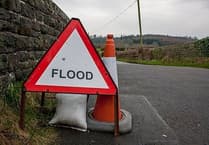THE Safety of Rwanda (asylum and immigration) Bill is the strongest measure yet to help tackle the issue of stopping the small boats from crossing the channel, writes MP Anne Marie Morris.
It passed through the House of Commons this week and will now be considered in the Lords.
The Bill is not perfect but will go a long way to deter illegal migrants. The issue is complicated by the international treaty we signed up to long ago - The European Convention on Human Rights.
That convention has been reinterpreted over the years (as has our own domestic legislation) to redefine human rights well beyond the original meaning of a right not to be physically or mentally tortured and a right of free speech.
The Convention is outdated, not least because its interpretation has been extended to include the right to a family life. While that is entirely honourable as an aspiration, that should not trump the right of a country to manage its own borders.
There are many legal routes to meet that aspiration. To address the problem, we need our own domestic laws, enforced solely by our national courts, not by the Strasbourg court. We also need to review our membership of that convention. We are not alone as a country wishing to do this. However, we have the huge benefit of being able to make that decision for ourselves post Brexit, unlike other EU nations.
The Animal Welfare (Livestock Exports) Bill was also debated in the House this week.
The Bill makes it an offence to export livestock and horses for slaughter and fattening, beginning in or transiting through Great Britain to a third country.
We are a nation of animal lovers and have some of the highest animal welfare standards in the world. I was proud to support this Bill which cements into law our commitment to animal welfare.
This week the Public Accounts Committee, on which I sit, released its report on the state of the UK’s preparedness for flooding. The current six-year £5.2 billion investment program which aims to better protect 336,000 properties by 2027, is behind its delivery schedule.
Intensifying climate change and deteriorating existing flood defences mean that over 200,000 properties are now at greater risk than ever before.
So, we need a fundamental rethink. We need to adapt to a new world where there will be more extreme weather events and more flooding. That means more not less flood defences – and it certainly means a fairer deal for rural communities which are currently short changed when it comes to investment in protection
While the broader struggles facing the NHS are well known, many GPs, especially in rural areas such as ours, are facing unique challenges without adequate response from central government.
At the heart of the issue is the Carr-Hill formula used to determine the amount of funding surgeries receive from NHS England.
While the formula was initially introduced to bring about much needed recognition of the uneven demands on surgeries serving wildly different populations, a number of issues have emerged over the years which have yet to be addressed.
Primarily the issue surrounding deprivation, with the most deprived areas serving 10per cent more patients with seven per cent less funding on average. Underfunding of General Practices in deprived areas has been a struggle for a long time now and that must be fixed. Here I come Secretary of State!
On Friday a trip out to the Stokeinteignhead Village Shop to see how it was doing was a treat as always. Lots of local produce and handicraft make it not just an anchor for the community but a place to visit for a few goodies. The brownies are fab.
As always, if you would like to book a surgery appointment (in-person or virtual) or raise a specific issue, please call my office on 01626 368277 or email [email protected] to arrange an appointment.





Comments
This article has no comments yet. Be the first to leave a comment.